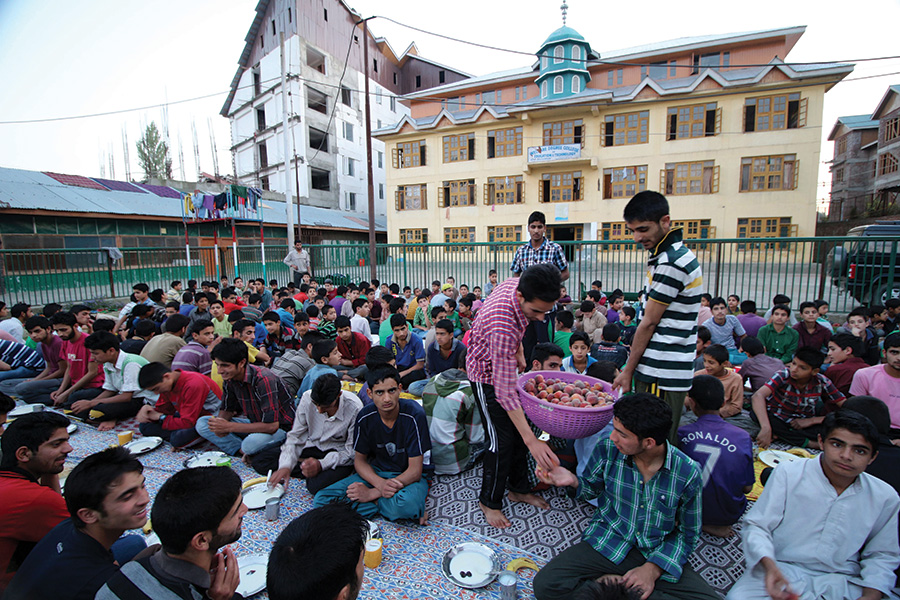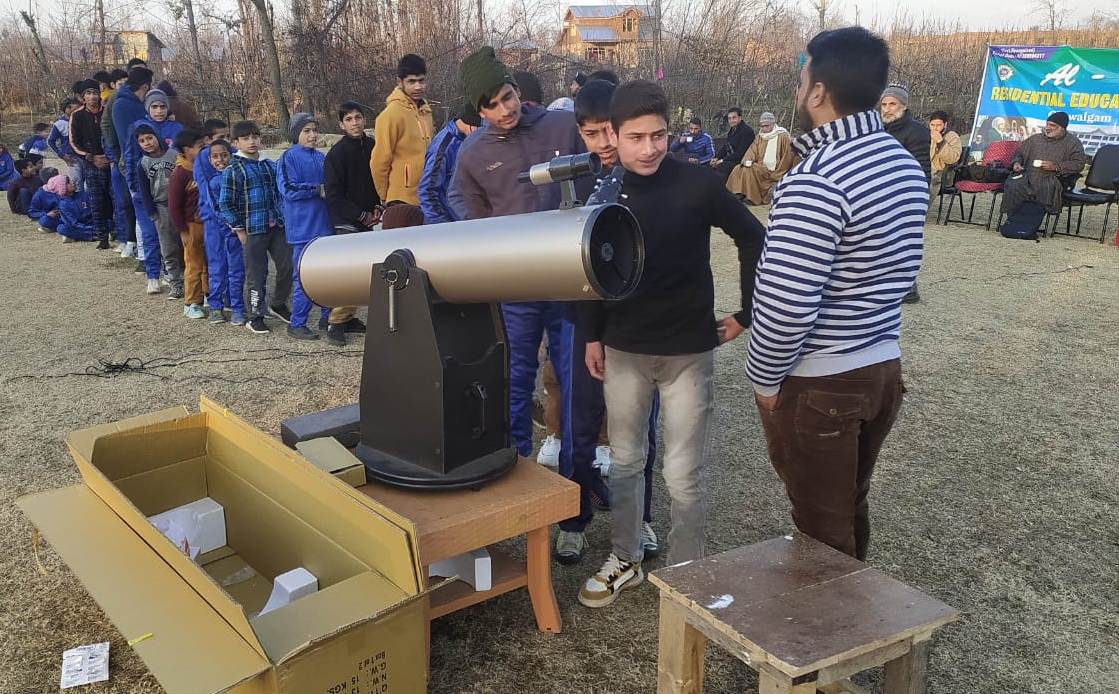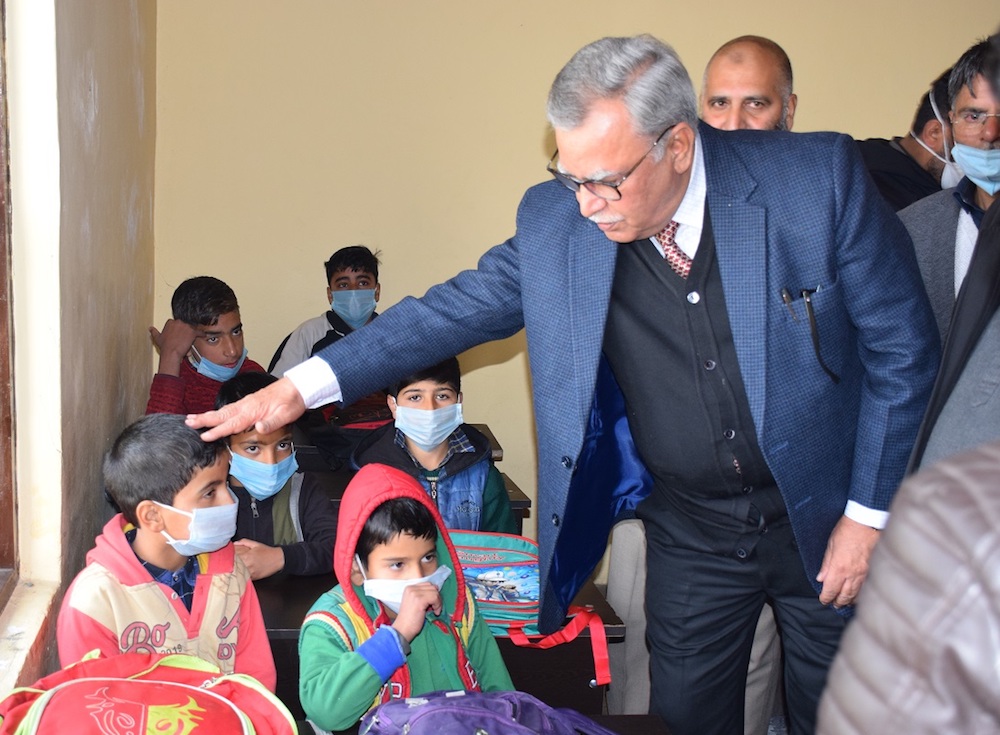As a sting operation involving Covid19 orphans shocked Kashmir society and the government, Minhaj Masoodi visited orphanages only to find that all the pandemic orphans are home and no orphanage in Kashmir has ever given a child in adoption, not even to childless local couples

― Kazuo Ishiguro, When We Were Orphans
On November 30, 2021, a sting operation by a Delhi based media organisation shocked Kashmir when two young men representing hitherto unknown Global Welfare Charitable Trust and Nobel Foundation offered Covid19 orphans for adoption. Asrar Amin, one of the Trust managers sought Rs 75000, a child.
Amin, as per the investigation was offering the orphans without any paperwork. Aijaz Ahmad Dar, who operated his Foundation from Pampore told on camera that he would involve doctors in stealing the orphaned newborns and claimed to be in contact with 500-600 orphans in 8-10 years of age. He demanded Rs10 lakh for such a child.
The expose brought Kashmir orphanages into an “unwanted” spotlight, with many people raising questions over the manner and conditions in which these NGOs and orphanages operate. It created a social media storm, with people making their anger and outrage known.
Government Response
This shocked even the government. Quickly a series of decisions were taken and implementation started. Admitting that they were caught unawares, Mission Director, Jammu and Kashmir Integrated Child Protection Services (JKICPS), Shabnam Kamili said they acted promptly.
“From the day we got this message on social media, we activated our child welfare committee and DCPO Pulwama,” Kamila said. “By that evening, we had the FIR’s registered against both the persons and by the next day, they were arrested and their offices sealed.”
One of the two NGOs, Kamila said had uploaded a post on Facebook in October 2020. “The person had been active since last October. He had posted on Facebook regarding child adoption,” Kamili said. “We had alerted the cyber police and SSP crime and sought action against him.”
The NGO, she said, is not registered. “It was not an orphanage either – just a small office.”

Covid19 Orphans
In a few days after the “expose”, Kamili said they checked the details of all Covid19 orphans. “Within three days, we had physical verification done of each and every Covid19 orphan and we have got certificates from all districts about all of them are fine. Besides, there was no report about missing child from anywhere.”
Jammu and Kashmir, Kamili said has quite a few Covid19 orphans. Already registered with Balswaraj NCPCR portal and PM Cares, Jammu and Kashmir currently has about 651 Covid orphans of whom 15 have lost both parents. “This is a dynamic figure and can go up,” Kamili said.
Of the many findings of the quick exercise, one key outcome was that not a single Covid19 orphan has been adopted so far.
“Only 15 are double orphans and they are being taken care of by their immediate families, the grandparents, uncles and aunts,” Kamili said. “Although they are under our scanner, but they are with their families.”

Galeazzo Ciano
70 Groups
But the sting operation has helped IPCS to revisit the entire infrastructure including all the organizations dealing with children. Right now, there are 54 such groups registered with them, though around 70 organizations operational currently. Some of them had not made any effort to get registered. By January 1, no organisation will be permitted to operate if they lack registration.
Kamili said the matter was taken up seriously by the government. “The Chief Secretary, Dr Arun Kumar Mehta took a meeting on December 2, and we are being reviewed every now and then by the higher authorities.” Two committees have been constituted, one each for Kashmir and Jammu for a detailed review of every orphan.
Conflict Destitution
The three-decade-long conflict has resulted in children getting orphaned. This led to the rise of many orphanages in Kashmir. Destitute management is a natural response in societies.
In wake of the sting operation, authorities have tasked officials to explore everything about the vast network of orphanages and their functioning. Even rules have been amended to prevent the exploitation of children. The social audit is in progress and the details will be known once the exercise is complete.
A JKAS Officer
However, the people who have spent their lives in these orphanages and built their careers are willing to talk and share details of their stints in these homes.
Gazi Abdullah qualified KAS in 2020. Born in 1996 in a Doda village, Abdullah’s father was consumed by the raging conflict in the region. Abdullah was two years old at the time of his father’s demise. After passing the fourth standard examination, he was sent to an orphanage in Srinagar, Welfare Education Institute, located at Chattabal-Bemina Crossing.

“It was in 2003-04. I was around nine years old at that time,” said Abdullah, insisting the Institute laid the foundation for him.
“My basic education and my foundation was laid there. Overall, the environment was cordial.” Although he conceded that it wasn’t exactly homely, nevertheless, “It was good.”
“There are chances you won’t exactly feel home-like, but you have to manage things.”
“A vacuum is created in one’s life after father’s death, that too when conditions at home are very difficult and you are financially weak,” he said.
In such a situation, Abdullah said, he did not know how he landed at the orphanage. “There was a link created through someone. The situation was such that I could not study. My mother deemed it right for me to study there in absence of my father.”
Abdullah studied at the Welfare Institute till tenth class and opted to complete his senior secondary education at Iqbal Memorial Institute, Srinagar which was also sponsored by the orphanage. However, all throughout his senior school studies, he continued to live at the orphanage.
After clearing his twelfth class, Abdullah went back his native district and completed his bachelor’s at Government Degree College, Doda. Thereafter he pursued a master’s programme in Botany from Aligarh Muslim University and consequently qualified KAS in 2020.
Although replete with instances of personal struggle, Abdullah said that his time at the orphanage shaped him into the person he is today. “There was an environment of inclusivity. I haven’t seen any discrimination on the basis of religion, region, caste, colour, or creed. We were people from Tanghdar, Kupwara, Doda, Kishtwar, even Ladakh and we lived in a very cordial manner,” Abdullah said. “My personal experience is that they have played a great role in shaping lives, at least my life.”
Talking about the orphanage that he was raised in, he said, “I can guarantee this much, that they treat a child as their own. Admissions were done through a proper procedure, records maintained.”
“When my father died, the villagers used to say, waen dazzi ni ati naar ti ghar’as manz (the hearth will go silent in this home). Such was the condition.”
To come out of that, whosoever child goes into an orphanage; he has experienced and matured a lot more because he has seen all that at a very tender age.
Tak Zaingiri
Ghulam Abbas Shah was also raised in an orphanage literally. He was ten years old, a student of the fifth primary when his father died of some illness.
“It was 1976. My father died. We were three siblings and our widowed mother.” Shah was forced to drop out of school as his family could not afford anything due to poverty. “I left school and was home for three years.”

Then one day, one of our relatives, who was married to Tak Zainageeri happened to visit Shah’s village at Lolab after a long gap of about 30 years. “My grandmother introduced us and my mother to her, saying that my mother is widowed and without any support system.”
It was at this point, she told Shah’s grandmother, that her husband (Zainageeri) takes care of orphans. He has established a hostel at Srinagar, Jammu and Kashmir Yateem Trust. “Bring your child there,” she told Shah’s mother.
Shah’s mother took him to Srinagar. “I was admitted in sixth class. The hostel was located at Shaheed Gunj at that time. I got enrolled at Government High School Batamaloo. Due to his hard work and guardianship of Zainageeri, Shah said he became the top-most student of the class.
The hostel was later shifted to Nowshera and Shah enrolled himself for his matriculation examinations at Soura Higher Secondary School. He completed his Bachelor’s in Science from Islamia College of Science and Commerce in 1981. At that time, they were 50 boys living in the hostel. “Tak Sahab was raising 50 children at the hostel from small donations and a little bit of help from the Social Welfare Department,” Shah said.
The Yateem Trust had no office. One of my seniors became a doctor and was a leading Oncologist at SKIMS. Today he teaches at GMC Baramulla, Shah said.
Turning Point
Shah then became a teacher and retired a few months ago. “I feel very proud to have been mentored by Tak Sahab. When he mentored me, only then have I been able to mentor my students and give back to society. Yateem Trust was a turning point in my life.”
Yateem Trust is Kashmir’s oldest orphanage. Founded by Tak Zainageeri in 1972, the Trust will complete 50 years in 2022. The trust now runs 13 orphanages out of which 12 are operating in the Kashmir division while one is in Banihal in the Jammu division. It manages about 550 orphans. Run by a board of trustees, the trust has a grass root level presence in the form of 80 units, which look at the grass-root level operations.
Zahoor Ahmad Tak, the patron of the Yateem Trust said that the organization would not have sustained for so long had any of it been engaged in the malpractices like the ones that recently surfaced. “The recent case, if true, is a sign of moral depravity and societal failure. It is an unforgivable crime. For those who are involved, an example should be made out of them. Because neither our society nor our religion allows it,” Zahoor said.
“There are countless people who have studied at our centres, were brought up here and are at exalted positions in government and other allied services. Our motto is serving the deserving,” Zahoor said.
Among the huge list of people, interestingly, one Kashmiri Pandit woman, who is now an Associate Professor of Sanskrit at Delhi University is also one of its pass outs.
The Yateem Khana
Chairman of the orphanage, Jammu and Kashmir Yateem Khana (JKYK) that runs Raahat Manzil, where Gazi Abdullah studied, Moin-ul-Islam said that they take children under their guardianship after proper verification.
“Our organization is open and transparent about its dealings. This organization is run only by local donations. Within the union of India, the money comes, we take it. We don’t take foreign money,” Moin said. “99.9 per cent of donations come from the valley.”
Currently, the orphanage has about 294 children enrolled there. “36 have recently appeared for the twelfth class exams.”
Sharing a list of inmates of the Raahat Manzil, established in 1998, Moin showed names of people who are now at established positions within and outside Kashmir. One prominent RJ also featured in that list. Besides, number of doctors, engineers, government officers, and businessmen, the list tells the contributions this home has made to the destitute.
“We test a few grains to get an idea of how the whole produce of grain is. That is why I am sharing a few names,” Moin said.
“The children enrolled in our institute come from very far-flung areas and from ignorant and depressed families. These children are psychologically very down. Our first try is to boost them psychologically.”
He said that they have incentivized the success of the children who excel in studies with cash prizes. “This gives them self-belief and helps them come out of that trauma to a certain extent.”
He added that when kids arrive into their orphanages without any proper guardianship, “We try to become their guardians and try to give them a good direction.” “This is the reason,” Moin-ul-Islam said, “Our kids remain here with utmost comfort and respect and dignity.”
When a child leaves the institute, Moin said they give them scholarships for first, second and third year. And if they want to pursue further studies and need further help, the scholarships are extended.
Additionally, he said that they create recurring deposit accounts in the name of every child from the time they enter till the time they leave. “We put Rs 500 per month in their account for the time they are here. And by the time, they leave we give that money so that they are able to take care of themselves and their familial needs when they go home,” Moin said.

Moin said that they don’t give children for adoption to anybody, not even childless couples. People, however, can sponsor the orphan children studying at the orphanage. “We have a scheme that if someone wants to sponsor a child, they can do so for Rs 30000 to Rs 40000 a year,” Moin said. After submitting the money, a copy of the child’s details such as name, photograph, the academic record is kept with them and they can monitor the progress. He said there is not a single instance where they have given children up for adoption.
“We do not believe in this. It is also not right from an Islamic point of view.” Raahat Manzil, however, does not take infants and toddlers. The minimum age for entry is six and they have to leave once they are 18.
Yateem Foundation
Of the various other organisations that are working on the orphanage front, Yateem Foundation is a major one. It runs a huge network within and outside Kashmir. In the last many years, it has created a huge network and infrastructure that enables it to teach the inmates even within the premises in Srinagar and other places.
Adoption Process
Most of the orphanages operating in Kashmir discourage adoptions. It, however, is legal. The hospitals are opting for the adoption route to manage the unwanted babies but their numbers are quite small.
Kamili said up until now, the adoption in Jammu and Kashmir would be handled by the Child Welfare Committee which would recommend children to the safe custody of people who required them, primarily childless couples.
“There is a whole gamut of formalities that are to be completed and it is a very time-consuming process,” Kamili said. “We have to be assured that children are very well cared for after they are taken.”
Social audit reports of parents and the families they will be adopted into are done and the social worker keeps on visiting the family. “If the child is not in good condition, we take the child back.”
So far Jammu and Kashmir has not adopted State Adoption Resource Agency (SARA), Kamili said. “It is a mechanism that is in progress and it would be established very soon. It is in administrative movement, and it has to assert in various verifications and all and we have to be very sure about things. So it is time-consuming but the ball was set rolling a long time back.” she said.
Now, with amendments in the Juvenile Justice Act, DCs have also been given the mandate to recommend adoption. “This is a process that is in the formulation. Guidelines would be out soon. A proper SARA and a proper adoption centre would be there,” Kamili said.















